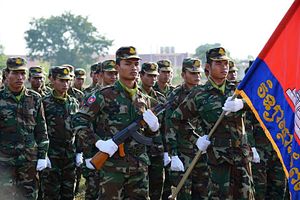This week, shortly after the White House officially announced a series of expected aid cuts on the Cambodian government on February 27, Cambodian Prime Minister Hun Sen made headlines of his own when he bragged about a new influx of weaponry into the Southeast Asian state. Though there in fact appears to be much less than meets the eye here, Hun Sen’s boast nonetheless fits into a broader pattern where the ruling Cambodian People’s Party (CPP) has been playing up its deepening defense ties with China to boost its domestic legitimacy as it nears elections in July.
As I have noted repeatedly in these pages, Cambodia has a long and strong defense relationship with China, with Beijing being the largest donor of military aid and asking few of the questions that some Western countries, including the United States and Australia, have over the country’s worsening rights record (See: “The Truth About US-China Competition in Cambodia”). Over the past few years in particular, Beijing and Phnom Penh have been expanding ties even further in this realm, including with new exercises and engagements. The two countries held their first naval drills in 2016.
That trend has unsurprisingly continued on into 2018, with both countries commemorating 60 years of bilateral ties and Cambodia heading into a general election in July. As we have gotten closer to those polls, the Hun Sen government has attempted to consolidate its authority, cracking down on opposition groups and severing certain elements of ties with some Western powers, even as the CPP has boosted ties with China (See: “Why Did Cambodia Just Downgrade Military Ties with the US Again?”). In December 2017, for example, during a visit to Cambodia, Major General Zhao Tianxing, the commander of the Air Defense Force and Artillery Academy of the People’s Liberation Army (PLA), said China would help further boost Cambodia’s military facilities in terms of personnel, equipment, and training.
So it came as little surprise when Hun Sen once again appeared to play up Beijing’s new military assistance again this week just as Washington was cutting aid to Cambodia. During a speech to thousands of factory workers in Kampong Speu province, Hun Sen bragged about the import of thousands of tons of weaponry that had occurred overnight. He didn’t specify the source country, though few had any doubt he was referring to China. Though he did not provide much in the way of specifics, he spoke of “up to 10,000 tons… of ammunitions and weapons” being transported in containers in shipments that were under the charge of Cambodia’s defense minister, Tea Banh.
Hun Sen’s statements were widely reported in local media outlets. But their vagueness, along with his penchant for hyperbole, made it difficult to verify the specifics of what he actually meant. In particular, the way Hun Sen spoke about the military equipment – which he termed “confidential” and “special goods” – made it seem like these were secret donations provided for Cambodia’s national defense by China in response to U.S. actions, and that was how some media outlets portrayed this.
Subsequent details, however, have cast doubt on the influx of weapons as a well-timed geopolitical development. Ministry spokesman Chum Socheat reportedly confirmed shortly after that the equipment was in fact an expected delivery in line with a military exercise both countries were already scheduled to hold in mid-March. As I had noted before, both sides had already suggested in January that the next iteration of Golden Dragon would be held this month as part of the commemoration of the 60th anniversary of China-Cambodia relations in Phnom Srouch district at Kampong Speu province, where Hun Sen was speaking (See: “What Will the Next China-Cambodia Military Exercise Looks Like?”).
If that is indeed the case, this appears to be yet another case of Hun Sen playing up existing Chinese military aid, both to shore up legitimacy for the CPP amid deteriorating ties with Western states as its authoritarian descent continues, as well as to emphasize that the Cambodian military continues to be boosted with Beijing’s assistance to secure both the country and the ruling party. This is not the first time the premier has done so, and it certainly will not be the last. That is worth keeping in mind should we see more headlines along these lines in the coming months and beyond.
































